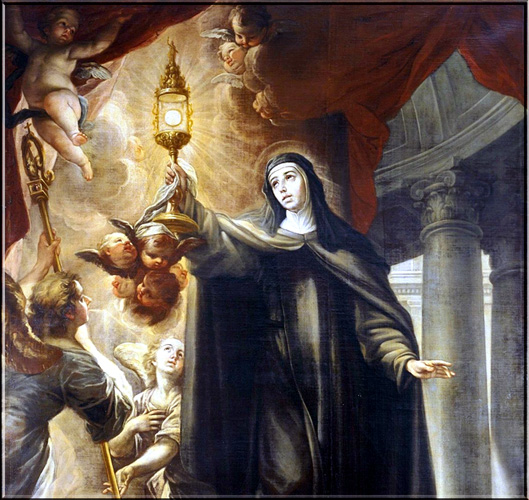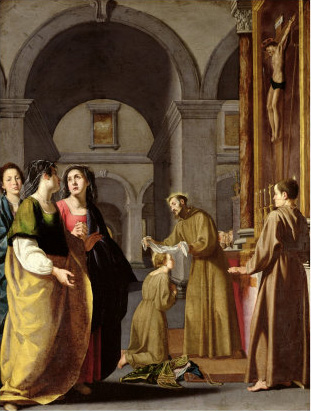
Saint Clare Driving Away the Infidels with the Eucharist

by Father Francis Xavier Weninger, 1876
Catholic Harbor of faith and Morals
St. Clare, foundress of the Order which bears her name, was born of rich and pious parents, at Assisi, in the district of Umbria, in Italy. She received the name of Clare, which means clear or bright, for the following reason. While her mother Hortulana, was kneeling before a crucifix, praying that God might aid her in her hour of delivery, she heard the words: "Do not fear. You will give birth to a light which shall illumine the whole world." From her earliest childhood, prayer was Clare's only delight. She gave to the poor all the presents which she received from her parents. She despised all costly garments, all worldly pleasures. Beneath the fine clothes she was obliged to wear, she wore a rough hair-girdle. She partook of so little food, that it seemed as if she wished to observe a continual fast.
During this same period lived St. Francis, surnamed "the Seraphic," on account of his great virtues. Clare frequently went to him and confided to him her desire to renounce the world and to consecrate her virginity to God, and to lead a perfect life in the most abject poverty. St. Francis who saw, that besides other gifts and graces, she was filled with the most ardent love of God, possessing great innocence of heart and despising the world, strengthened her in her holy desire, while at the same time he tested her constancy. Being sufficiently convinced that her desires were inspired by Heaven, he advised Clare to leave her home, which she did on Palm Sunday, going to the church of the Portiuncula, where she had her hair cut off, as a sign that she would enter a religious life. She divested herself of all feminine ornaments, and attired in a penitential garb, tied around her with a cord, she was placed by St. Francis in a vacant Benedictine convent. She was at that time just eighteen years of age.

When her parents heard of what she had done, they hastened to the Convent, to take Clare home, declaring that this choice of a state of life was only a childish whim, or that she had been persuaded to it by others. Clare, however, after opposing their arguments, fled into the church, and clinging to the altar with one hand, with the other she bared her head shorn of its hair, exclaiming: "Know all, that I desire no other bridegroom than Jesus Christ. Understanding well what I was doing, I chose Him and I will never leave Him." Astonished at this answer, all returned home, admiring her virtue and piety. Clare thanked God for this victory and was, on account of it, all the more strengthened in her resolution. She had a sister younger than herself, named Agnes. A few days later she, too, fled from her parents' roof and going to Clare, wished to be invested in the same habit and to serve God in the same manner. St. Clare received her joyfully, but as all her relatives were provoked beyond measure that she, too, had entered a Convent, twelve of them went and forcibly tore her from her sister's arms. Clare took refuge in prayer, and as if inspired by the Almighty, ran after her sister, loudly calling her by name. God assisted her by a miracle. Agnes suddenly became immovable, as if rooted to the ground, and no one possessed strength enough to drag her from where she stood. Recognizing in this the powerful hand of God, they opposed her no longer, but allowed her to return to the Convent. Meanwhile, St. Francis had rebuilt the old church of St. Damian and had bought the neighboring house. Into this house he placed his first two religious daughters, Clare and Agnes, who were speedily joined by others, desirous of conforming themselves to the rule of life which St. Francis had given to Clare. This was the beginning of the Order of Poor Clares, which has since given to the world so many shining examples of virtue and holiness, to the salvation of many thousands of souls.
St. Clare was appointed abbess by St. Francis, and filled the office for forty-two years with wonderful wisdom and holiness. Her mother also, together with her youngest daughter, took the habit and submitted to the government of St. Clare. The holy abbess enjoined on her order the most severe poverty, and when the Pope himself offered her some property as an endowment, she humbly but earnestly refused to accept it. She was, to all in her charge, a bright example of poverty. In austerity towards herself she was more to be admired than imitated. The floor or a bundle of straw was her bed ; a piece of wood, her pillow. Twice during the year she kept a forty days' fast on bread and water. Besides this, three days of the week, she tasted no food, and so little on the others, that it is marvellous that she could sustain life with it. The greater part of the night she spent in prayer, and her desire for mortification was so great, that St. Francis compelled her to moderate her austerities. She nursed the sick with the greatest pleasure, as in this work of charity, she found almost constant opportunity to mortify and overcome herself. Besides all her other virtues, she was especially remarkable for her devotion to the Blessed Sacrament. She sometimes remained whole hours immovable before the Tabernacle, and was often seen in ecstacy, so great was her love for the Saviour it concealed. She sought her comfort in Him alone in all her trials, amidst all her persecutions; and how great were the graces she thereby received, the following event will sufficiently illustrate.

The Saracens besieged Assisi and made preparations to scale the walls of the Convent. St. Clare, who was sick at the time, had herself carried to the gates of the convent, where, with the Ciborium, containing the Blessed Sacrament, in her hands, prostrating herself in company with all her religious, she cried aloud: "O Lord, do not give into the hands of the infidels the souls of those who acknowledge and praise Thee. Protect and preserve Thy handmaidens whom Thou hast redeemed with Thy precious blood." A voice was distinctly heard, saying: "I will protect you always." The result proved that this was the voice of heaven. The Saracens, seized with a sudden fear, betook themselves to flight, those who had already scaled the walls, became blind, and flung themselves down. Thus were St. Clare and her religious protected and the whole city preserved from utter devastation, by the piety and devotion of the Saint to the Blessed Sacrament.
We must omit many miracles which God wrought through His faithful servant, in order to relate her happy end. She had reached the age of sixty years, during twenty-eight of which she had suffered from various painful maladies, though she had not been confined to her bed, or rather, her bundle of straw. Her patience while suffering was remarkable, and she was never heard to complain of the severity or the duration of her sickness. The contemplation of the Passion of Christ made her own pains easy and even pleasing to her. "How short," said she one day, "seems the night to me, which I pass in the contemplation of the Lord's suffering!" At another time, she exclaimed: "How can man complain when he beholds Christ hanging upon the cross and covered with blood!" Having suffered so long and with such noble resignation, she saw at last, that her end was near. She received the Blessed Sacrament, and then exhorted all her daughters not to relax in their zeal to live in poverty and holiness.
When her confessor conversed with her on the merits of patience, she said: "As long as I have had the grace to serve God in the religious state, no care, no penance, no sickness has seemed hard to me. Oh, how comforting it is to suffer for the love of Christ!" The hour of her death drew near, and she saw a great many white-robed virgins come to meet her, among whom was one who surpassed all the rest in beauty. She followed them and they led her to see the Almighty face to face. Several who had read in the depths of her heart, said that she died more from the fervor of her love for God than from the effects of her sickness. Her holy death took place in 1253. The great number of miracles wrought after her death through her intercession, and the heroic virtues which made her so remarkable, induced Pope Alexander IV., only two years later, to place her in the number of Saints.
PRACTICAL CONSIDERATIONS.
"How can man complain when he beholds Christ hanging on the cross and covered with blood," asked St. Clare; and she also said that those nights in which she contemplated the passion of Our Lord, seemed short. During her long and painful maladies, she meditated on all the sufferings which Our Lord endured to save us, and by this means, learned such resignation that she not only had no thought of murmuring against Divine Providence, but also bore her pains with great interior consolation. See your crucified Saviour and think: "What is my suffering compared to that which my Redeemer endured for love of me? My Jesus has suffered with patience, with joy, and even with the desire to suffer still more. Why then should I be impatient and faint-hearted." With such thoughts you should animate yourself, especially during the night, as it is generally then that pains increase. Remember the night, the bitter night, which your Saviour passed in the house of Caiaphas, maltreated in every possible manner, and pray for grace, to bear the cross laid upon you, with patience and fortitude. Only try it once and you will find great relief. St. Gregory said rightly: "Remembering the sufferings of Christ, we can bear everything patiently, how heavy soever it may be.


No comments:
Post a Comment
Note: Only a member of this blog may post a comment.